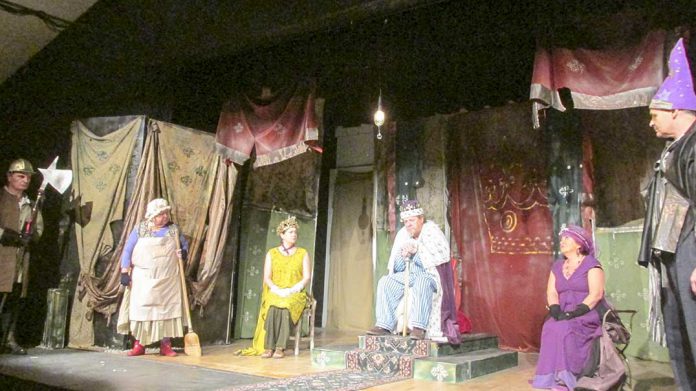WIIKWEMKOONG—A group of women, and friends of women, gathered at the Assiginack Curling Club for an International Women’s Day March 8 to join in a discussion on the topic ‘When love hurts: a woman’s guide to understanding abuse in relationships.’
Ngwaagan Gamig Recovery Centre (Rainbow Lodge), with help from Manitoulin Family Resources and the Mnidoo Minising Coalition Against Domestic Violence, hosted the event featuring special guest speaker David Cory, stepping in for his wife Jill Cory who had fallen ill prior to the gathering. Ms. Cory is the co-author of the book for which the presentation is named.
Mr. Cory began the presentation by sharing startling statistics, such as half of all Canadian women over the age of 16 have experienced at least one incident of male violence and the fact that every six days in Canada, a woman is killed.
He spoke of the many inaccurate stereotypes women who live with abuse face, like ‘women are attracted to men who are abusive,’ or ‘the abuse goes both ways,’ referencing one woman’s story who was told by a responding police officer that she “gave as good as she got.”
“The types of victims are greatly different,” Mr. Cory added. “The impacts are greater for women,” he said, noting the greater potential for fear, injury, patterns of abuse and even stalking. Of abuse victims, 88-95 percent are women.
So how can men be part of the solution? Change the narrative; know that social justice is a shared human responsibility; remember that violence against women affects men’s lives too (moms, aunties, sisters, grandmas, friends); help end a system that devalues femininity; stop being threatened by unmasculine qualities and be free from gender stereotypes.
Other stereotypes include the thought that ‘women make bad choices’ and ‘she can leave.’
Mr. Cory shared that about 26 percent of women who are murdered had left the relationship. Half of those murdered women were killed within two months of leaving. He also gave the startling statistic that women are six times more likely to be killed by an ex-partner than by their current partner and that almost 60 percent of all dating violence happens after the relationship has ended.
Mr. Cory said society should steer clear of using the term ‘domestic violence’ as this suggests that the violence is limited to a domicile, or home. This isn’t necessarily so, he said. Family violence, too, is another confusing term as it lumps the entire family unit in when the children may not be abused.
Some of the women in attendance thought that this was unfair as even though a partner may not be abusing the children, the children are still affected.
Mr. Cory also went through the cycle of abuse, which is the honeymoon period followed by tension (jealousy, fault finding etc.) and, finally, explosion. He noted that men will often seek out vulnerable women to abuse.
Using psychological, physical, verbal, sexual, emotional, intellectual, financial and spiritual abuse, cutting women off from social circles, using their culture as a means for abuse (“This is my culture, so I can do what I want”) and even killing or harming pets are all ways men abuse women.
“Men do this intentionally,” he said. “They would never treat their boss this way! It’s all about power and control.”
Common control tactics include orchestrating her public image; women being worried of the potential for escalation; creating dependence on their male partner; surveillance and monitoring; emotional blackmail; lying; and obsessive jealousy.
Mr. Cory said men need to change from thinking that they are central, superior and deserving to being connected, equal and mutual.
One woman in the audience suggested refraining from stopping little boys from playing with dolls and vice versa, little girls from playing with trucks. “This should be considered a good thing—good training for when they become parents,” she said.
The presenter also spoke of perpetrators and the role of substance abuse; an excuse for violence. “He only hits me when he’s drinking,” is a common phrase.
On the other side, alcohol dependency is 15 times more prevalent in abused women, he told the group, and girls who experience sexual abuse are far more likely to engage in risky behaviour.
When dealing with an abused woman, Mr. Cory reminded the audience that the woman is the expert on her own life and that safety is always the priority. He urged them to try and understand each woman and her complexities and to always believe them.
“Do not pathologize coping and survival skills,” he said. “Adopt a woman-centered approach and bring a message of hope and healing.”
“There’s so much a woman has to go through,” one woman said. ‘Thank you for your words on what to do and what can be done.”




